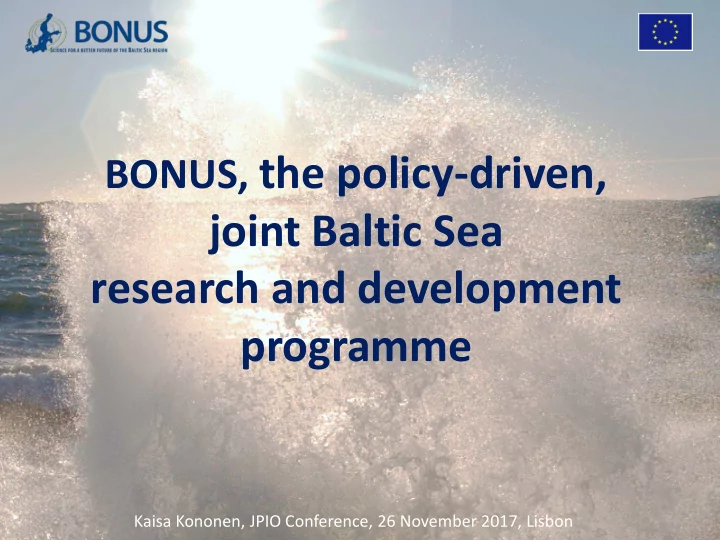

BONUS, the policy-driven, joint Baltic Sea research and development programme Kaisa Kononen, JPIO Conference, 26 November 2017, Lisbon
BONUS SRA, a systemic approach responding to dynamic development in relevant policy fields 19 themes Coast and catchment Societal responses Ecosystem Sustainable use of Observation and goods and services data management
BONUS calls: • 5 calls in BONUS Art 185 and 1 in BONUS+ • Currently open – synthesis call, 18-month desk-top studies start in 2018 • 56 projects worth ca. EUR 120 million involving a total of 16 countries – 27 projects still ongoing • Over 100 region’s leading universities and institutions and 35 businesses • More than 1000 researchers • Coordinating and delivering cutting edge science & technological advances
BONUS Art 185 projects’ SRA coverage RESEARCH THEMES (ABBREVIATED TITLES) THE SRA THEMES’ COVERAGE 1.1 Dynamics of biogeochemical processes 1.2 Changing biodiversity BAMBI, BIO-C3 1.3 Food web structure and dynamics BLUEWEBS 1.4 Impacts of hazardous substances BALTHEALTH, MICROPOLL 2.1 Changes in catchment land cover patterns SOILS2SEA 2.2 The role of the coastal systems COCOA 2.3 Integrated coastal management BALTCOAST MICROALGAE, OPTITREAT, PROMISE, 2.4 Eco-technological approaches SWERA, ZEB, CLEANWATER, RETURN 3.1 Maritime risk analysis and management STORMWINDS 3.2 Effects of air and water pollution by shipping SHEBA 3.3 Improving stock assessments, spatial INSPIRE heterogeneity of stocks 3.4 Evaluation framework for fisheries management 3.5 Sustainable aquaculture in the Baltic Sea CLEANAQ, FLAVOPHAGE, OPTIMUS 4.1 Governance structures, performance and CHANGE, GO4BALTIC, GOHERR, MIRACLE policy instruments 4.2 Linking ecosystem goods and services to BALTICAPP human lifestyles and well-being 4.3 Maritime spatial planning BALTSPACE, BASMATI 5.1 Integrated monitoring programmes BLUEPRINT, INTEGRAL AFISMON, FERRYSCOPE, FISHVIEW, 5.2 Innovative measurement techniques HARDCORE, PINBAL, ECOMAP , SEAMOUNT ANCHOR, ESABALT, GEOILWATCH 5.3 User-driven ICT services
BONUS impact on scientific excellence Snoeijs-Leijonmalm et al. 2017: Towards better integration of environmental science in society: lessons from BONUS, the joint Baltic Sea environmental research and development programme. Environmental Science and Policy 78: 193-209.
BONUS impact on policies Summary of stakeholder views relating to science and policy development, funding and engagement Responses to statement: Participants Funders Users A: Use of science in policy-making increased n/a B: Scientists’ direct involvement in advice at policy-making increased n/a C: Speed of uptake of scientific knowledge increased n/a D: Policy-making and governance now more integrated and cross-sectoral n/a E: Cooperation between the funders of academic research and industries increased n/a F: Research increasingly transnational and integrative n/a G: Coordination and integration between the funding organisations increased n/a H: Input from private enterprise into research projects increased I: Involvement of other stakeholders in scientific research increased J: Stakeholders and knowledge-users involved in defining research agendas K: Contribution of academia to development of industries increased Summary of stakeholder views relating to specific impacts of the wider BONUS programme Responses to statement: Participants Funders Users L: Positive impact on the joint use of research infrastructure M: Positive impact on the cost-efficiency of research N: Positive impact on research, governance and management structures O: Positive impact on research management practices
• Snoeijs-Leijonmalm et al. 2017: Towards better integration of environmental science in society: lessons from BONUS, the joint Baltic Sea environmental research and development programme. Environmental Science and Policy 78: 193-209
The BONUS thematic symposia series I BONUS symposium: Science delivery for sustainable use of the Baltic Sea living resources • Tallinn (EE), 17-19 October 2017 • An Estonian EC presidency event • Core contributions by BONUS INSPIRE, BIO-C3, GOHERR; contributions from BONUS BAMBI, BALTICAPP, BLUEWEB CHANGE, BALTCOAST, OPTIMUS, as well as BONUS+ ECOSUPPORT and IBAM 150 registered participants representing all Baltic Sea states, the Netherlands, Norway and the United States • II BONUS symposium: Shipping and the environment – From regional to global perspective Gothenburg (SE), 24-25 October 2017 Core contributions by BONUS SHEBA (the EU SBSR flagship) and the international Surface ocean - lower atmosphe study (SOLAS) 117 registered participants representing 14 (!) states: Belgium, Denmark, Estonia, Finland, France, Germany, Sweden, Malta, Norway, Poland, Portugal, PRC, United Kingdom and the United States III BONUS symposium: Sustainable ecosystem governance under changing climate and land use in the Baltic Sea Gdansk (PL), 14-16 March 2018 Core contributions by BONUS BALTICAPP, GO4BALTIC, MIRACLE and SOILS2SEA abstract submission and registration ongoing More BONUS symposia to come! -
BONUS final evaluation • ...overriding conclusion is that BONUS has been in many ways a great success.. • BONUS was relevant....remains relevant.. • ...small but potentially important contribution to EU science diplomacy.... • ...BONUS has clearly made contributions to a wide range of EU policy objectives... http://ec.europa.eu/research/evaluations/pdf/fin al_bonus_report.pdf ?
BONUS final evaluation BONUS has... • clearly increased the level of cooperation among researchers...had something of a structuring effect • enhanced research capacity...and increased both the quantity and the quality of relevant scientific output • addressed key societal and environmental challenges • been very efficient • coheres well with other aspects of EU policy • reduced fragmentation of research and made it more integrated and interdisciplinary than before • pulls together the available resources, provides a greater impact from research and raises its international visibility
BONUS future Towards sustainable blue growth Joint Baltic Sea and North Sea research and innovation programme to be developed as Coordination and Support Action during 2018-2021 • Underpins EU and national policies and strategies e.g. Europe’s blue growth strategy • Elevates the Northern European region’s research and innovation capacity • Provides a decisive boost in development of a sustainable marine and maritime economy • Builds on the legacy of BONUS, the joint Baltic Sea research and development programme • Seeks synergies with JPI Oceans and other ongoing initiatives
THANK YOU! Kaisa Kononen kaisa.kononen@bonuseeig.fi www.bonusportal.org www.bonusportal.org/projects
Recommend
More recommend